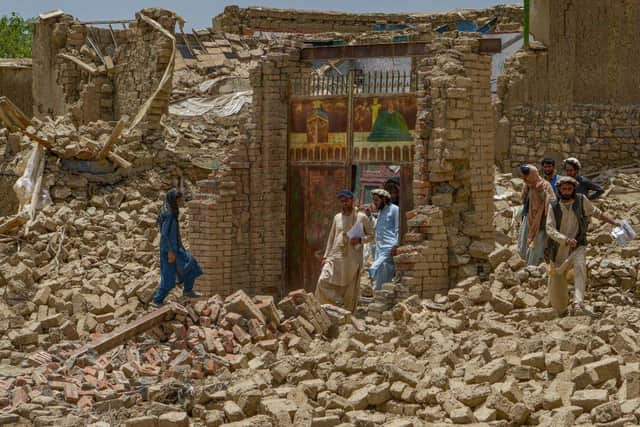Afghanistan earthquake: How the Taliban regime has had to ask for international help
More than 1,000 people have died in the disaster, including “many” children, doctors working in the region have warned.
“The government is working within its capabilities,” Taliban official Anas Haqqani said in a tweet. “We hope that the international community & aid agencies will also help our people in this dire situation.”
Advertisement
Hide AdAdvertisement
Hide AdThe Taliban regime quickly regained control of the country a year ago following the withdrawal of US-led forces. The economy has subsequently collapsed and Afghanistan is going through a dire humanitarian crisis with some 3.5 million people displaced inside the country.


Millions of others are struggling to survive amid rising levels of poverty and hunger, with social services under immense strain. It is estimated around 90 per cent of the population is living below the poverty line, on less than $2 (£1.63) a day.
No country has yet recognised the Taliban as legitimate rulers of the country, mainly due to their human rights record, particularly relating to their treatment of Afghan women and girls. Despite initially insisting they would not revert to previous Taliban policies, the group has since suspended high school education for most girls and banned women from working in certain government departments.
As a result, any western countries which want to provide support have to be careful their aid does not breach international sanctions on Afghanistan. While humanitarian aid is permitted, development aid is not.
The UK's special representative to Afghanistan, Nigel Casey, said the UK was in touch with the UN and was "ready to contribute to the international response".


The earthquake, which the European seismological agency EMSC said was felt across more than 310 miles by 119 million people across Afghanistan, Pakistan and India, has caused enormous devastation.
“It is heart-breaking to see this tragedy unfolding in Afghanistan on top of the ongoing humanitarian crisis that Afghans are going through every day,” said Filippo Grandi, United Nations High Commissioner for Refugees (UNHCR). “UNHCR stands with Afghans at this difficult time and will make all efforts to provide relief to those affected.
“This tragedy highlights once again that Afghans need and deserve the world’s solidarity and support.”
Advertisement
Hide AdAdvertisement
Hide AdDr Filippo Costa Buranelli, senior lecturer in international relations at the University of St Andrews, said he believed the international cry for help indicated the Taliban’s growing attempts at international recognition.
“I would have expected it, because even if it is an unusual move, the new Taliban government – that is the one that came to rule Afghanistan after the August events of last year – has been more diplomatically pro-actively engaged with the neighbours and the international community.
“It's certainly a leadership which has tried to signal to the international community that something at least at the diplomatic level has changed, even if domestically we know that change has not been taken place to a large extent.
"[They have] certainly been establishing contacts and dialogue with the neighbouring countries and also targeting and reaching out to the broader international community. So this plea for help falls in a series of diplomatic public moves that the Taliban have been making over the past few months.”
The Informal Group of Neighbouring Countries of Afghanistan, which comprises China, Russia, Uzbekistan, Tajikistan, Turkmenistan, India, Pakistan and Iran, have been offering support, as well as acting as a platform for international communication with the regime thorough economic and logistic means.
In March, Turkmenistan became the first Central Asian country to recognise a Taliban envoy to the Afghan embassy in its capital. Meanwhile, Uzbekistan recently shipped some cargo through Afghan ports to Pakistan, as an alternative to its usual routes, which had been disrupted by the conflict in Ukraine.
Dr Buranelli said: “[The Informal Group] is pursuing a very pragmatic foreign policy and therefore humanitarian aid, food and even electricity has been coming from Central Asia. So there seem to be a informal, regional set of governance that is keeping Afghanistan alive and engaged.
"But when it comes to the broader international community, the issue is that even if agencies or states would like to promote aid and support or extend it to the Afghan government and the broader Afghan society, there is always the risk of incurring secondary sanctions.
Advertisement
Hide AdAdvertisement
Hide Ad“What has been happening regionally signals that some states are not mentioning the word ‘recognition’, but with their behaviour are getting along with the incumbent regime and getting ready to co-operate with it. But at the same time here, the elephant in the room is the legitimacy of the Taliban government. It's about how long can you support the economy of a state whose government is not recognised formally by anyone in the international community.”
There is about $9 billion [£7.36bn] frozen in accounts held by the US, which belongs to the former democratically-elected Afghan government that was ousted last summer. Central Bank, Da Afghanistan Bank, while technically an independent institution, has Noor Ahmad Agha, a senior Taliban military and financial leader, as one of its governors.
Dr Buranelli said the most straightforward way for Afghanistan to receive international support is via the UN. However, he warned the process could be slow and cumbersome.
He said: “It seems to me that the only way forward at the moment is to rely on humanitarian agencies that basically hinge on the UN system. There is always a very thin line between development and aid, which are subject to two different legal regimes.
"States and NGOs are very much wary again of breaching these these sanctions, so relying on the UN to me is the only way forward, but things have to be sped up because the situation is on the brink of collapse.”
Comments
Want to join the conversation? Please or to comment on this article.
